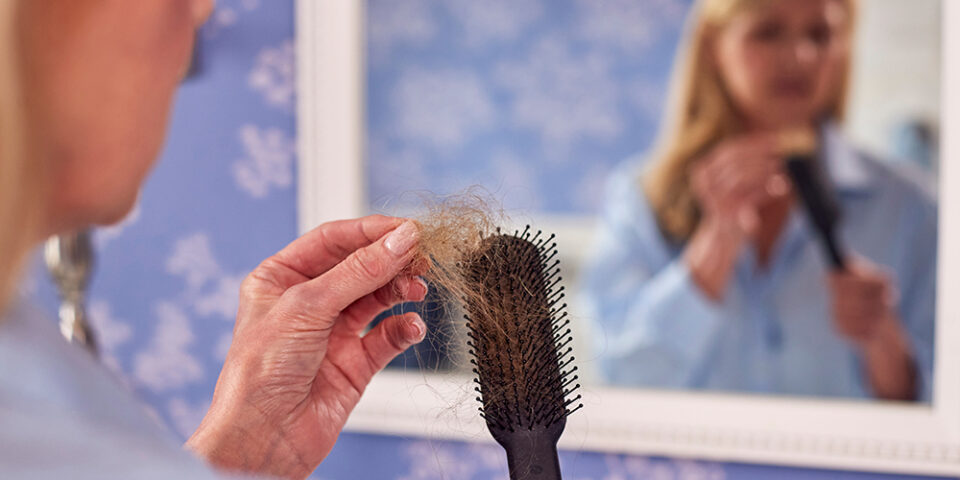Menopause symptoms you might not know about
The thought of menopause probably has you thinking of hot flashes, night sweats and, of course, no more periods. But there are other ways menopause can affect your body that may be lesser known. OB/GYN Elizabeth Nodelman, MD, explained four menopause symptoms you might not know about and what can be done about them.
Skin and hair
During menopause, the collagen in skin decreases as estrogen drops, causing skin to become thinner and dryer in some women. Hair may also begin to thin out and recede.
“Hair loss is especially common and can be impacted by so many factors,” Dr. Nodelman said. “I wish that it was just one thing and if we gave you some estrogen, your hair would be luscious and beautiful, but there’s a strong genetic component.”
That doesn’t mean nothing can be done. Talk to your doctor to see what treatments might be right for you. A different skin care routine can help improve dryness and sagging, and products with the ingredient minoxidil might be able to help with hair thinning. Eating a healthy diet can also help.
“What we put into our bodies is important,” Dr. Nodelman said. “If you have a poor diet, it’s going to affect your skin and hair.”
Heart health
“Studies have shown that women who go through early menopause – early 40s or younger – have an increased heart health risk,” Dr. Nodelman said. “Studies have also shown that women who start hormone replacement therapy early, as well as into their late 40s and early 50s, have better cardiovascular health later in life.”
Once a woman reaches age 65, however, hormone replacement therapy has been found to actually increase heart health risk.
“Most women aren’t starting menopause at age 65, so if you begin taking hormone therapy when your symptoms are starting – in your late 40s, early 50s – then we do think there’s a protective benefit for your heart health,” she said.
Muscle loss
Hormone changes that happen during menopause can not only make it harder to lose weight – by changing where fat is distributed in the body – but it can also lower energy levels and muscle mass.
“Some women in menopause have very low energy levels, which can be helped by hormone replacement therapy,” Dr. Nodelman said. “Raising those energy levels can help them get to the gym more often.”
As a general rule for all aging women, lifting light weights and increasing protein intake can help prevent muscle wasting.
Vaginal changes
Vaginal atrophy – a thinning and drying of the vaginal walls – is something that usually occurs later in menopause or post-menopause. This can lead to painful intercourse and more frequent urination and urinary tract infections.
Dr. Nodelman said topical vaginal estrogen is a low-risk treatment that can improve overall vulvar, vaginal and urethral health.
“To reduce the risk of UTI, it’s helpful to drink water and cut back on super sugary drinks and drinks that have artificial sweeteners,” she added.
The final word on menopause symptoms
Regardless of what type of menopause symptom you’re having, don’t suffer in silence.
“Make sure you have a provider you feel comfortable talking to about these issues,” Dr. Nodelman said. “Women know about hot flashes, but we’re not always as open about the other things that are happening. For many of my patients, once we start to really get into the nitty gritty of what they’re going through, we find that much of it can be attributed to menopause and there are treatments available.”
Choose a caring, trusted OB/GYN
Find a provider who’s right for you by viewing their online profiles, star ratings and reviews.
Find an OB/GYN

